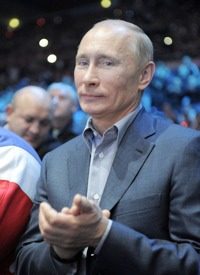
Putin, in his campaign, has warned Europe and America not to interfere in the Russian elections. In the 2008 elections, Medvedev received 71 percent of the vote, and the United Russia Party, the vehicle of Putin, won 315 out of 450 seats in the Duma (the Russian national legislature).
Even otherwise meek governments in Europe did not consider these elections fair or honest. The Czech government commented that the "election campaign did not conform to democratic standards.” The German government said, "Russia was not a democracy and Russia is not a democracy.” The British Foreign Ministry stated that there were allegations that, “if proven correct, would suggest that the Russian elections were neither free nor fair." Even those governments that congratulated Putin’s party on its victories did so with deeply expressed reservations.
In actual fact, former KGB officer Vladimir Putin is essentially the “boss” of Russia. Medvedev makes about as much pretense of being independent of Putin as Molotov made of being independent of Stalin 80 years ago. Those familiar with Soviet history know that Stalin often portrayed himself as simply an ordinary Soviet citizen who happened to be General Secretary (at different points in history also known as First Secretary) of the Communist Party of the Soviet Union.
Vyacheslav Molotov, at different times both Premier and Foreign Minister, always acted in a way that best served the purposes of communism as defined by the Politburo, whose decisions were identical with whatever Stalin thought best.
Analysts have wondered why Putin is making a show of keeping the West from trying to influence elections that increasingly resemble the old elections in the Soviet Union. And why he is making statements such as, "All our foreign partners need to understand this: Russia is a democratic country. It's a reliable and predictable partner with which they can and must reach agreement, but on which they cannot impose anything from the outside."
Putin spent his entire adult life as a disciplined member of the Communist Party, holding a position that would be roughly equivalent in Nazi Germany to a high-ranking official in the Gestapo or the SS. What Russia looks like today is similar to what is was under the period of Stalin’s rise to power. So when Putin, in his recent announcement, referred constantly to the need for a “stable political system” and larger defense spending to protect the “dignity of the nation,” observers noted that in light of his overwhelming political muscle in the Duma and the generally understood corruption of Russian elections, Putin has all the “political stability” he needs.
Most analysts believe that Putin will win the election — with his United Russian Party gaining a sizable majority in the Duma. They believe that Medvedev will serve in whatever particular role Putin believes best. They say that Russia in the 21st century is looking increasingly like Russia in the 20th century.
Photo of Vladimir Putin: AP Images



